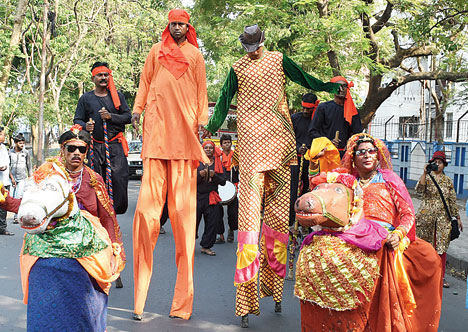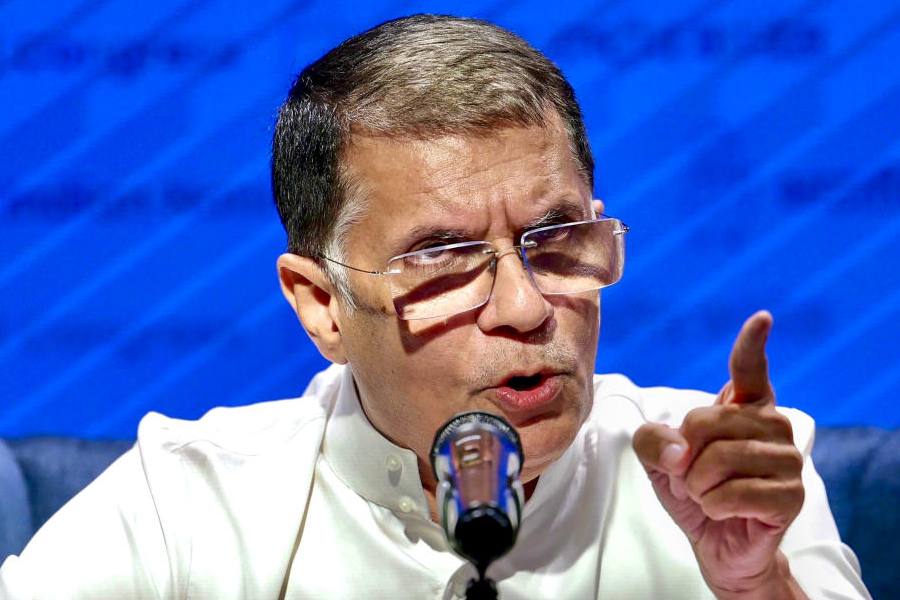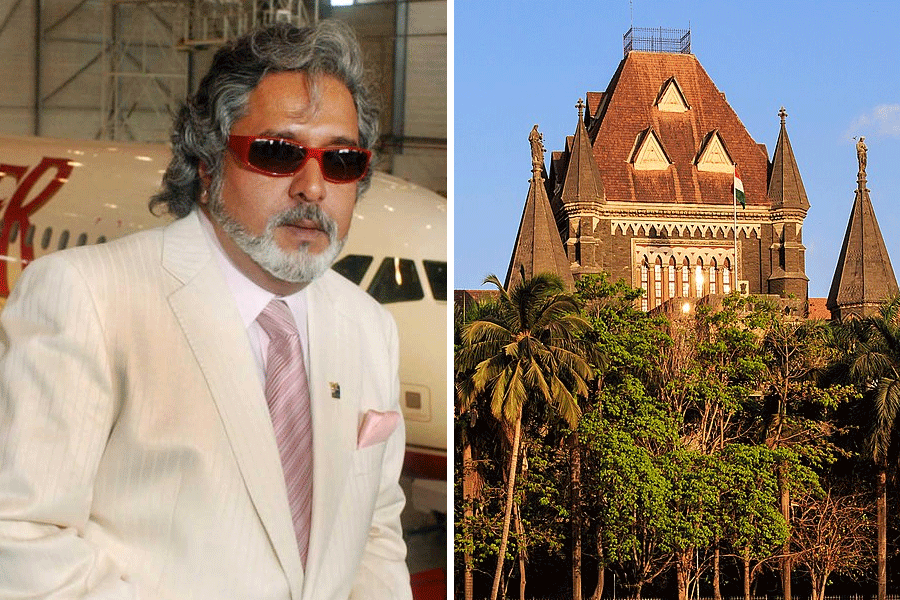BIDHANNAGAR BANGLA NABO BARSHO UDJAPON COMMITTEE


The aged overcame arthritis, the tots overcame drowsiness and they all ushered in the Bengali New Year by walking from Labony Estate to the Tagore statue opposite Central Park.
Bidhannagar Bangla Nabo Barsho Udjapon committee had also got stilt walkers, women dhakis from Purulia, singers and dancers who performed using miniature horses as props. “Poila Baisakh would be incomplete without music so we all sang songs like Esho he Baisakh and Dhitang dhitang bole,” said Sanchita Ghosh of IA Block. Maya Mitra blew the conch shell.
“I had wanted to wear a dhoti but couldn’t find a matching kurta in time,” said Rishi Dey of BC Block, who came in a kurta-pyjama.
Sudipta Ghoshal, an IA Block resident in her 20s, said it wasn’t easy waking up at dawn and draping a sari, but that she wanted to do it to feel connected with her roots. She also indulged in a selfie spree with friends. “Clicking is a must! After all, we have put in so much effort in getting dressed for the occasion,” she reasoned.
“This spontaneous participation of the youth shows that our culture still holds its own in the world of Facebook and WhatsApp,” felt Debraj Sengupta of FE Block.
Baisakhi Nandi, a septuagenarian of BB Block, was walking despite arthritis. “Poila Baisakh procession reminds me of my collage days,” she smiled. Shatatara Mitra, who, at five years of age, was perhaps the youngest reveller, said it was painful waking up at 5am but that she was glad she did.
“We have held smaller processions like this in the past years but this time we have scaled up,” said Kesto Chattopadhay, convenor of the organising committee. “When we start the new year on a positive note we have hope of a better tomorrow.”
Shatadipa Bhattacharya
BIDHANNAGAR WALKERS CLUB

The stretch in front of De Sovrani hotel was turned into a stage by and for members of Bidhannagar Walkers Club on the first day of Baisakh. Many a member sang, recited and shared wellness tips for all to follow in the coming year.
A group of ladies from Purbachal began with a chorus of Esho he Baisakh and Chandan Ghatak chanted a sloka and reminded all that the key to a healthy nation was to maintain cleanliness in our immediate surroundings.
Pran Gopal Saha spoke on yoga, P.K. Mukherjee spoke on the urgency of removing parthenium bushes and Alok Bhadra shared childhood memories of Poila Baisakh. “We would decorate the entrance to our houses with flowers and twigs, take out prabhat pheri and seek blessings of our elders. All this is often not possible for the present generation. They work late nights, sometimes live out of the country and so cannot celebrate like we did,” he said.
Despite the fanfare, some did not know which Bengali year they were welcoming. But octogenerian Sitangshu Ganguly knew it was 1425. “I calculate with respect to my age so it becomes easy to remember,” grinned the HA Block resident who also presented a rare piece from Tagore — Alpo loiya thaki tai mor jaha jai.
“In our time we would make sure we wrote letters to friends and relatives on Poila Baisakh. Such practices have now faded away but we still try to celebrate it so the human touch remains,” said Gopal Krishna Fouzdar, one of the organisers of the event.
Bharati Kanjilal
MALLIKA MALANCHA

Residents of Mallika Malancha led a colourful Poila Baisakh probhat pheri around the Eco Urban Village area.
Dressed in festive red and white, residents began walking together outside their complex led by a chorus from Sanjukta Das, Rina Batabyal and Sumana Chakrabarty. Esho he baishakh, Momo chitte, Dhonilo ahoban — they sang and all others backed them up.
Kakoli Saha and Binita Palit had choreographed dances for children and they too performed alongside.
As the procession crossed neighbouring complexes — Highland Willows, Anahita, Sunrise Symphony — residents hopped out of their homes and joined enthusiastically.
CK-CL BLOCK

The CK-CL Block association organised a cultural evening on Poila Baisakh.
Twelve-year-old Shastik Ray played songs like Jodi tor dak shune and Purano sei on his guitar and nine-year-old Mallar Bose sang Amra shobai raja and Aha ki anando. “I practised for just seven days but it was all right as I learn classical music round the year,” said the CL Block resident, who performed in jeans and T-shirt. “I’m not very comfortable performing in traditional wear so I chose this,” he smiled.
“There is nothing wrong in moving forward, but it is important to stay rooted to our culture. Performances like these show that our next generation is not as lost as people accuse them of being,” said 72-year-old Gouri Sen from the audience.
Samir Kumar Ghosh, another septugenarian, recalled Poila Baisakh celebrations of his youth. “In our time, we too used to go out and enjoy with friends. But we always began our day with a visit to the temple. This is a ritual I still practise,” he said.
The star attraction of the evening was a sitar and santoor jugalbandi by guest artistes Debal Ghosh and Pinak Bhattacharya.
“We hadn’t celebrated Nava Varsha over the past few years but wanted to do something innovative this year,” said Sanjoy Kabiraj, one of the organisers. “The sitar-santoor combination is rare and we are happy to see so many elderly residents enjoying it today.”
Shatadipa Bhattacharya
BF BLOCK LIBRARY

BF Block residents ushered in the Bengali New Year on a literary note. It was the 24th foundation day of the library being celebrated in their community hall and authors Tilottama Majumdar and Smaranjit Chakraborty had come down for an interactive session with the audience.
“Society influences painters, musicians and writers but one cannot force them to work on nothing but the current state of affairs,” said Tilottama Majumdar, when emcee Rama Mookherjee asked her if authors felt political pressure.
“For instance, Sunil Gangopadhyay wrote a love story Radha Krishna during the Naxal period. He faced flak from readers who said he should be taking a political stand through his writings but an author deserves freedom of thought. Then again there are authors who write on politics in the disguise of something unrelated. Franz Kafka’s The Castle would be such a novel.”
Smaranjit Chakraborty shared with the audience the gist of The Book Thief by Markus Zusak, where a Jewish child in Nazi Germany steals books to read to an ailing Jewish rebel as she had heard books can heal people. “We all have a book thief in us that we have to keep alive,” he said.
In reply to those who observed a dwindling interest in reading among the youth, Chakraborty begged to differ. “If the youth wasn’t reading, I would not have survived. I don’t care if they read the printed letter or e-books, as long as they make purchases. If they download pirated e-books publishers and authors lose out,” he said.
The BF Block library is run by a working committee of 12 women and they have around 100 members. “We desperately want more members to join, especially from among the younger generation,” said library convenor Bijoli Bhattacharjee.
The evening concluded with music and recitation. Shuhita Bhattacharjee, an English professor and block resident, recited a poem in the context of the Kashmir child rape incident, written by her mother-in-law Rama Mookherjee.










